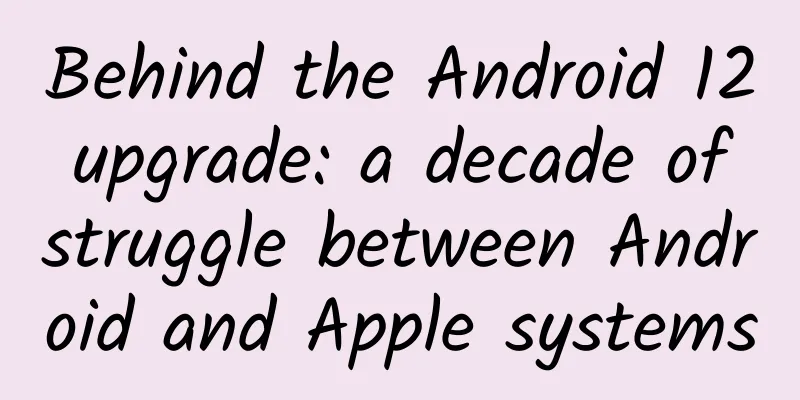Behind the Android 12 upgrade: a decade of struggle between Android and Apple systems

|
Although Android still has many problems, it is undeniable that this former Apple imitator is no longer what it used to be. In the more than ten years of competition among smartphone operating systems, Android is the only player that has been able to compete with Apple's iOS. Sameer Samat, Google's vice president of products, announced at the developer conference that the number of active Android devices worldwide has exceeded 3 billion, and Android has once again firmly established itself as the world's largest operating system. If we look back at the relationship between Android and iOS, Android, which was once considered an imitator, surpassed a number of players by opening up to hardware manufacturers several years ago and became on par with Apple's iOS. Now the two have become in a relationship of mutual imitation and competition. However, neither of them is as glorious as imagined. Android's open source positioning has also had drawbacks, resulting in unstable system reputation and limited revenue space for Android to bring to Google Play. iOS has not yet escaped the negative impact of the "Apple tax" and faces huge fines. The system problems that have been exposed time and time again have also affected its reputation. The changing mobile phone industry is also seeing the emergence of new players. Can Android and iOS continue to maintain their dominance in the smartphone operating system market? 1. How did Android catch up with iOS?In the melee of smartphone operating systems more than ten years ago, Apple iOS, Nokia Symbian, Microsoft Windows Mobile, Google Android and BlackBerry OS all attracted a group of loyal users, among which Android was not the most favored player. On January 9, 2007, the first generation of Apple mobile phones equipped with iOS won many fans as soon as they were released. iOS is indeed a revolutionary product with obvious advantages: smooth operating experience, rich applications, and exquisite system interface are difficult to match by other systems. iOS has pushed smartphones and mobile OS to a new stage. Google realized that the crisis was brewing, but it was still a step too late. About 18 months later, the first Android phone, HTC Dream, was hastily launched on the market. At that time, Nokia was still popular in the mobile phone field around the world, making the Symbian system have an absolute advantage in the mobile phone market. This also made Nokia's chairman at the time, Jorma Ollila, claim that "a competition has begun between Nokia, the industry leader, and Apple, the challenger." It seems that not many people are looking at Android, and some even say that Android will not survive for more than a year. Android is also considered to be an imitator, and in the early days it was questioned for having too many traces of iOS. But to people's surprise, many Android-powered phones quickly became popular.
According to statistics on mobile phone sales in 2010 by market research firm Gartner, the top five mobile phone manufacturers in the world were Nokia with sales of 460 million units, Samsung with sales of 280 million units, LG with sales of 114 million units, RIM with sales of 47.45 million units, and Apple with sales of 46.59 million units. Samsung and LG both produce Android smartphones. In addition, Sony, Ericsson, Motorola, HTC and other manufacturers that have maintained cooperative relations with Android also rank among the top ten in terms of mobile phone sales in the world. Hardware manufacturers have been at the forefront, helping Android expand its market. In fact, on the day the Android system was released, Google took the lead in establishing the "Open Handset Alliance", which brought together mobile phone manufacturers including HTC and Motorola. Google's open market strategy for Android has also won over a large number of partners. In contrast, Windows Mobile charges a licensing fee for each device, and Apple's iOS is closed. Both the mobile phone and the system are self-developed and not open source. Android has welcomed mobile phone hardware manufacturers with a free and open source attitude from the beginning, and since then these leading manufacturers have also helped Android's market share to new heights. Within two or three years after the launch of iOS and Android, the smartphone operating system reached a turning point. The original three-way battle between Google Android, Apple iOS and Nokia Symbian evolved into a fierce battle between Android and iOS. Prior to this, relying on Nokia's huge market sales volume, Symbian had long held the position of "number one" in the mobile phone operating system market. However, as Nokia's mobile phones stagnated, Symbian's market share continued to decline. The Symbian system once had very distinct advantages, which led to the creation of generations of popular mobile phones, but its many drawbacks were also very obvious: the system code was outdated, making it difficult to add new core functions; it was developed in C++, which resulted in a high development threshold and was not conducive to the construction of a software ecosystem; and at the user level, the Symbian system was complex to use and difficult for users to get started.
Nokia finally decided to abandon Symbian and turned to Microsoft. In October 2010, Microsoft released the smartphone operating system Windows Phone. The following year, the two companies reached a strategic alliance and jointly developed it. However, the alliance of the two heavyweight players still failed to shake the position of Android and iOS. As a closed-source system, Windows Phone started late and failed to establish a software ecosystem. The models it launched also failed to gain much market share. In a research report released by Nielsen, Android ranked first in the smartphone market share in 2012, accounting for 46.3% of the market share, and iOS accounted for 30%. At this point, only Android and iOS are left competing for dominance. 2. Compete in the market by imitating each otherAndroid and iOS have become the two factions representing smartphone systems. Due to their completely different attitudes towards user experience, developer ecosystem, hardware manufacturers, etc., people have been arguing over the issue of "who is the most powerful mobile operating system" for nearly a decade. But in recent years, iOS and Android, two players, have gradually moved towards imitating each other. As early as several years ago, Apple began to imitate Android, its former follower. When Android was first released, its cross-application and cross-platform account mechanism was its advantage. A few years later, cross-platform information transmission and cross-device clipboard between Apple iOS and other devices were gradually realized, and finally surpassed Android in terms of experience. Nowadays, similar changes in iOS have also caused dissatisfaction among users. In June 2020, Apple updated iOS 14, which is the system with the biggest changes in appearance since iOS 7, but it has received questions such as "Is iOS becoming more and more like Android?" and "Is this iOS still the simple and elegant design as before?"
The transformation of iOS, an industry disruptor, is difficult for people to accept, but in fact, as user habits gradually develop and stabilize, the iOS system must cater to more users. At the same time, if one party gets ahead, the other party must catch up. Just half a month ago, Apple launched iOS 14.5, which comes with a stricter app ad tracking transparency function, which protects personal privacy data to a certain extent. Soon after, Google stated in its developer blog that it would follow this feature and the Android system would launch a "privacy label". In addition to imitating each other, the two are also undergoing changes: Android, which has been open to hardware manufacturers, is beginning to become less "open", while Apple, which has always been open to developers, has continuously raised the "Apple tax", which has led to the defection of some developers. Android's open source positioning has allowed a large number of hardware manufacturers to expand its territory, but on the other hand, hardware manufacturers are each operating independently, resulting in serious fragmentation problems. As a result, Android has long had problems such as difficult system upgrades, slow upgrade speeds, and low coverage. The large number of uncontrolled Android phones on the market may also affect the system's reputation. As early as 2017, there were rumors that Google began to restrict major hardware manufacturers and deeply customize the interface style of ROM. In 2018, Google required hardware manufacturers to update the system to users on time and in quantity. Google has tried to prevent the deterioration of the Android ecosystem and has reached a cooperation with Qualcomm to jointly complete the upgrade and adaptation work, which can also unify some experiences of the Android ecosystem. Google is very determined to control Android fragmentation and unify the user experience, but the solutions it actually proposed cannot be accepted by all hardware manufacturers. Compared with its previous openness, Google has gradually tightened its control, which has also made hardware manufacturers dissatisfied. In recent years, many manufacturers have begun to develop their own mobile phone operating systems.
Developers who previously gave priority to iOS now have many complaints about Apple. In the early days, Apple had very appealing hardware such as the iPhone and iPad, and also built an ecosystem that brought together high-quality software. It benefited developers through a payment method such as sharing downloads, making iOS supported by developers. In contrast, Android developers have been suffering from the pain of profitability because a large number of Android third-party stores are filled with free, pirated, and cracked apps, which prevents developers from achieving scale through them. But in recent years, Apple has become less "open" to developers, especially in the repeated controversy over the "Apple tax". In 2019, Spotify complained to the European Commission about Apple, one of the main complaints being that Apple's AppStore charges APP developers a commission of up to 30%, which weakens their competitiveness. In June of that year, the European Commission launched an investigation into this. On April 30, 2021, there was progress in Spotify's complaint against the AppStore. The European Union officially launched an antitrust lawsuit against Apple. This is the first time that the European Union has accused Apple in the name of antitrust. If Apple loses the case, it will have to pay a fine of up to 10% of its annual revenue. Since the development of Android and iOS, they have been learning from each other's strengths and weaknesses, refusing to make concessions to each other, and have been competing to this day. 3. It’s hard to tell who wins and who losesIn the past decade, it has been difficult to determine the winner in the fierce competition between Android and iOS. On the surface, the market share of mobile operating systems occupied by the two has long been different. As early as 2012, a mobile data report by Jumptap showed that Android and iOS devices accounted for 91% of the smartphone traffic on the US mobile network. Android ranked first with a market share of 58.8%. As time goes by, Android has formed an absolute monopoly, leaving less than 20% for iOS. According to Statista data, as of 2019, Android leads with 87% market share. In the global mobile phone market share, the top five Samsung, Huawei, Xiaomi and vivo are all in the Android camp, and Apple phones will never return to the era of monopoly. Judging from market share alone, it can be said that Android has won over Apple, but in terms of revenue, the situation is completely the opposite. A report released by App Annie showed that in the first quarter of 2021, Apple App Store revenue was US$21 billion and Google Play revenue was US$11 billion, the former being nearly twice that of the latter. However, affected by the "Apple tax" storm, it remains unknown whether the App Store's revenue can be maintained in the future. At the same time, after each iOS update in the past two years, the system has become extremely unstable and may also lead to user loss. Someone once summarized the various system problems hidden in iOS 11, including the inability to pair iPhone with AirPods, iPhone 6 and iPhone 7 black screen restarting in a loop, etc. iOS 11 was even called the "king of bugs". At the same time, the iPhone was caught up in the "throttling gate" storm. iOS will automatically reduce the performance of the iPhone according to the battery performance, but will not notify the user. Behind repeated negative controversies, more and more Apple users are no longer loyal to the iOS system.
On the other hand, for Google, there is little room for improvement in the revenue generated by Android. China has become one of the largest markets for Android, but the Chinese market is special. Since most Chinese Android phones do not have Google Play, and do not have applications such as Gmail, Google Maps, and Google Docs, Google cannot generate revenue from them, and Chinese mobile phone manufacturers are currently gradually taking away more mobile phone market share. In addition to the crisis of declining revenue, Android's status is also facing more threats. Android is open source. If any manufacturer can develop an operating system that is better than Android, it will threaten Google's current position. The emergence of more and more hardware manufacturers with similar Android systems is not good news for Google. Especially in the Chinese market, Huawei has to launch Hongmeng OS after being cut off from supply by Google. Although the current software ecosystem is in urgent need of completion, it is very likely that Chinese users will choose Hongmeng OS in the future, and Android's market share will also be affected. There are also many people eyeing the market. On January 13, 2021, Tesla founder Musk announced that he would soon develop a new mobile phone operating system to replace Android and Apple. In the future, the operating system field will also usher in the next era. At present, people's speculation points to the future war of the Internet of Things: a new system will support cross-platform operation, not only for mobile phones, but also for various terminal devices such as cars and smart homes. For Apple and Google, they must also make comprehensive preparations. Just like how Android and iOS once caught up with the trend of smartphone operating systems and left Microsoft behind, now these two powerhouses are destined to usher in the change of the times and accept challenges from more emerging players. |
<<: Apple quietly pushes the first beta version of iOS 14.7: iOS 14.6 will soon be released
Recommend
How much does it cost to customize an office supplies mini program in Suining?
There is no fixed price for the customization of ...
New media marketing strategy for B2B!
B2C companies have many ways to use social media,...
An article to understand the best route to learn Android
[[155803]] Preface I saw an article saying "...
Private domain operation strategy for beauty brands!
Preface As the vanguard of the new brand wave, th...
Alipay Ant Forest, does it have a product operation routine?
This article mainly conducts a detailed analysis ...
After the new regulations of TikTok, here are the secrets to double the traffic of new accounts on dou+!
Recently, Douyin released an important announceme...
Disassemble Xiaohongshu's competitive keywords and master the brand placement strategy
Xiaohongshu’s brand marketing cannot be separated...
"Douyin Increase Fans and Monetize" can increase fans and monetize by using mobile phones or moving
Mr. Crab's "Douyin Fan Increase and Cash...
Build a ToB market operation system from 0 to 1!
Editor's note: In previous articles, the auth...
What is the Pomegranate Algorithm? How to deal with the pomegranate algorithm?
From the perspective of the entire Internet ecosy...
Event Operation Design Framework
This article takes games as an example to introdu...
How to plan an event? You will understand everything after reading this!
Organizing an event is actually a very tedious an...
What are the writing techniques for creative titles of Baidu promotion bidding?
How to write advertising creatives for Baidu prom...
How to find deleted WeChat payment records? Official tips
Nowadays, mobile payment has become the norm when...
Big news, Mitchell is diagnosed with COVID-19! Mitchell tested positive for the new coronavirus!
On March 12, Beijing time, according to US media ...









